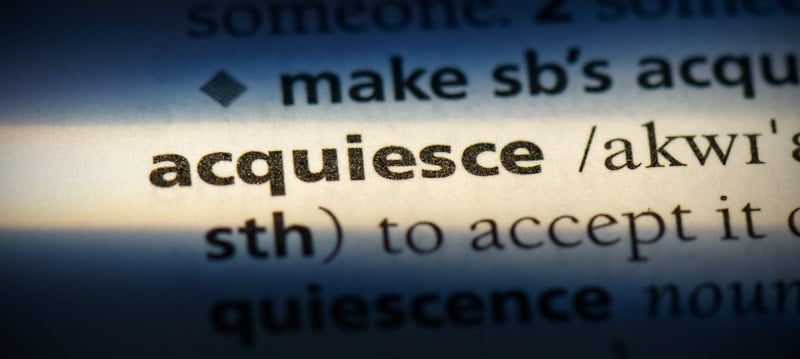Some situations in life can put you in a corner such that you find yourself agreeing to something against your will; such cases are common among peers as they try to defend each other. The act of agreeing to something unwillingly is to “acquiesce.” Let’s now look at acquiesce definition and meaning.
“Acquiesce” verb: passive acceptance or submission. Use the word to describe someone agreeing to something without wanting to. A good example is in the office where the employees have to do what the manager says even if they do not want to.
“Acquiesce” is often used with “to” or “in,” depending on what you are talking about. It is one of the words that can be confusing to use. Fortunately, this article will highlight everything you need to know about this word, i.e., acquiesce definition, meaning, history, spelling, pronunciation, word forms, and usage.

What is the Definition of Acquiesce?
“Acquiesce” verb: To agree to something or a particular demand without contest. That means you agree quietly without protest. Use the word in a situation where someone follows orders without protesting even if the orders are not outstanding, suitable, or you do not want to.
Let’s look at some examples.
- John will acquiesce to everything you tell him to do because he is sick and confused.
- While Mildred did not want to go on a blind date, her sister insisted until she finally pressured her to acquiesce.
- After the protest by the students, the administration had no choice but to acquiesce and let them have a school party.
What is the Meaning of Acquiesce?
“Acquiesce” Verb: forbear opposition and do something but not heartily. At times you might want to oppose something but do it so that you do not break someone’s heart or avoid arguments. You can use the word “acquiesce” to describe such situations.
Let’s look at some examples.
- Brenda decided to acquiesce and hand over her engagement ring to the thief.
- David knew that the company would do well in the future; he had no choice but to acquiesce to the partner’s decision to sell.
- Edwin would rather acquiesce to his pregnant wife’s demands than listen to her whining.
Synonyms and Antonyms of Acquiesce
The English language has some words with the same meaning or near meaning and others opposite. Learning these words will help improve your vocabulary and make it easier to express yourself. Having said that, here is a look at the synonyms and antonyms of “acquiesce.
Synonyms
- Allow
- Accede
- Agree
- Permit
- Tolerate
- Accommodate
- Adjust
- Bend
- Concede
- Yield
- Surrender
- Budge
- Relent
- Bow
- Quit
Antonyms
- Resists
- Defy
- Oppose
- Disagree
- Object
- Hinder
- Deny
- Argue
- Reject
- Disallow
- Call out
- Negate
- Refute
- Question
- Forbear
Words That Rhyme With Acquiesce
English is a beautiful language where you will find words with the same sound though they do not have the same meaning and definition. Such words are referred to as rhyming words. If you are looking for words that rhyme with acquiesce, here is a list of words to check.
- Address
- Finesse
- Redress
- Express
- Progress
- Compress
- Acquiesce
- Profess
- Princess
- Depress
- Goddess
- Success
- Guess
- Mess
- Suppress
How to Use Acquiesce in a Sentence
Use the word “acquiesce” to mean to comply with something quietly. It is used when someone agrees to something though they do not like or want to do it. The word is a verb, and it also has a negative connotation to it—more on that below.
Is Acquiesce a Negative Word?
Though “acquiesce” means to agree to something, it is not a positive word. The reason is that the word describes people who agree on something or an idea to avoid protesting or complicating the situation.
So when using “acquiesce,” keep in mind that though it might appear as a positive word, it has a negative connotation. It is used when someone agrees to something even if they do not want to. Keep the negative undertone in mind when using this word.
Acquiesce Different Parts of Speech
Do you know you can use this word in different forms and sentences in various contexts? Here is how to use “acquiesce” in different parts of speech.
Acquiescence (noun): The act of consent by silence or without objection
Let’s look at some examples.
- Phiona’s acquiescence to the manager’s demands is worrying.
- Everyone was shocked about the president’s acquiescence to the plan.
- The priest inclined his head as a sign of acquiescence to the youth’s demands.
Acquiescent (adjective): Willing to agree or accept something without objection or protest.
Let’s look at some examples.
- The plan is to have him think I am acquiescent to the choice.
- It shocked every team member when we found villagers less acquiescent to the proposed project.
- We do not get along with my brother because he is too acquiescent to the law.
Other Word Forms of Acquiesce
- Acquiescing
- Acquiescingly
- Non-acquiescing
- Non-acquiescent
- Acquiesced
10 Examples Of Acquiesce In A Sentence
Learning and understanding a new word from its definitions and meaning is not easy. That is why it is essential also to take the time to read sentences of the new word that you have learned. That way, you will have a better idea of how you should use the word. Here is a look at the sentences with the word “acquiesce.”
- Peter seemed to acquiesce to her demands.
- She acquiesces to her mother’s demands for her to stay.
- Leon expected his wife to acquiesce to everything he said, but that was not the case.
- I had no choice but to acquiesce since I was too sleepy and wanted to sleep.
- Though he acquiesces to the schedule, no one is sure he will follow through with it.
- Mark got fired since he did not acquiesce with the other employees, which led to his relationship with the other staff being complicated.
- Though I am forced to acquiesce to your decision, I want you to know that I do not like it.
- I am not happy with your acquiesce decision to fire the chef.
- Though it was harsh, I acquiesce entirely with the remarks you made about my products.
- His parents do not want him to marry from another tribe, but he hopes that they will acquiesce over time
How Do You Spell Acquiesce?
The proper way to spell the word “acquiesce” is “a.c.q.u.i.e.s.c.e.”
When spelling the word, do not forget the last “c” of the word. It is vital to learn how to spell a word before using it in your sentences. By doing this, you will avoid embarrassing mistakes. If you use the word in formal writing and do not spell it as required, people might not take your writing seriously. Most will assume that if you did not take the time to learn the spellings of the word that you are writing, then the information you give is not important.
How Do You Pronounce Acquiesce?
The word “acquiesce” best pronunciation is “[ ak-wee-es }” When pronouncing this word, do not pull it. However, the pronunciation is very fast and slows down a bit when you get to the end.
If you plan on giving a speech, understand that how you pronounce your words will significantly impact whether the people listening to you will know what you say. That is why proper pronunciation is vital. Take the time to practice how to pronounce new words to perfection.
How Many Syllables Are In Acquiesce?
The word “acquiesce” has three syllables divided as “ac.qui.esce.”
The stressed syllable of the word is “esce.” But this is the type of word with the main stress syllable and a secondary syllable. So, the second stress syllable is “ac.”
History & Etymology of Acquiesce
Another best way that you can use to understand a word is to learn its origin. In the case of “acquiesce,” the origin of the word is from the Latin “acquiēscere,” This Latin word means “to remain at rest or to agree without a protest.”
The French latter borrowed the word “acquiescer” but retained the same meaning as the Latin. The meaning did not change even when the word was introduced to the English language as “asquiesce.”
This is one of the few words that has retained the original meaning throughout the different translations and over time. Very few words retain their original meaning throughout the translation, which is the one trait that makes this word unique.
When Was Acquiesce First Used?
The first use of the word “acquiesce” was in 1615.
The word’s first use was “to agree with what someone wants or accept what they do even if you do not agree with it.”
Conclusion
So you want to disagree or protest something but choose not to, this is best described with “acquiesce.” Just like this word has retained its meaning over the centuries, its use in various sentences also inclines towards the standard meaning.
It is a common situation, and most people do not know how to express it. Now that you have understood acquiesce definition, meaning, pronunciation, and spelling, it is time to get creative and create unique sentences to help you understand the word better.
Shawn Manaher is the founder and CEO of The Content Authority. He’s one part content manager, one part writing ninja organizer, and two parts leader of top content creators. You don’t even want to know what he calls pancakes.


